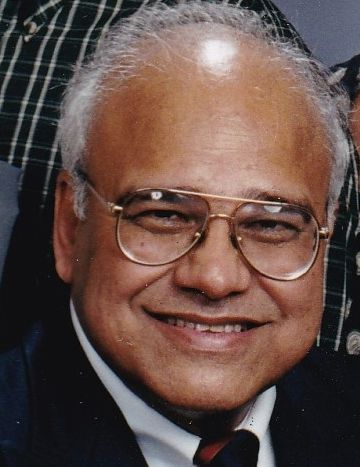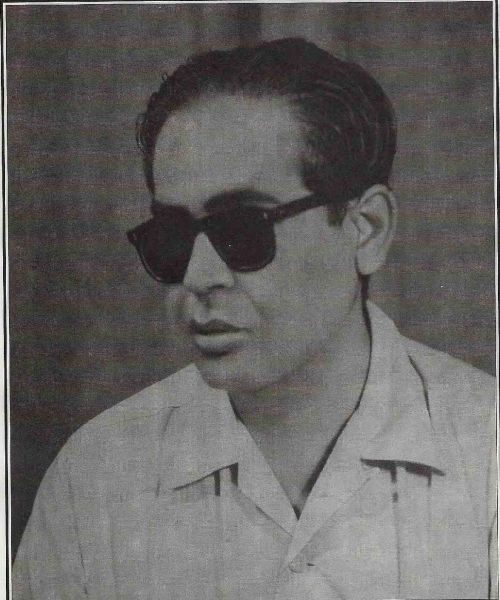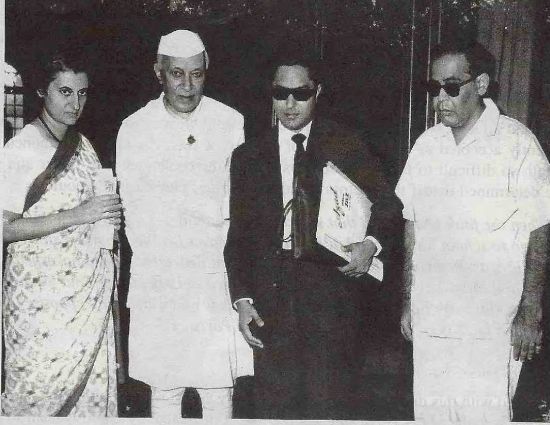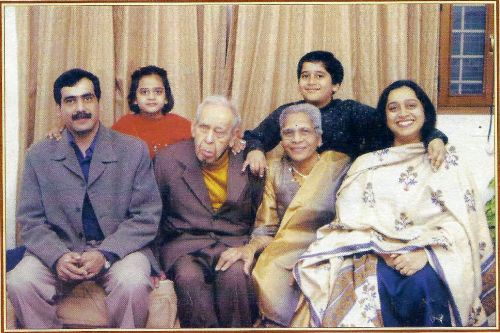Latest Contributions
Lal Advani - A Lifelong Champion of the Handicapped
Category:

Jay Khandeker is B.E. (Mechanical Engineering) from B.H.U. Varanasi (1959), and M.S. (Industrial Engineering) from Purdue University, Indiana (1964). He worked in senior executive positions with many large organizations including Tata Motors Limited, Pune, Arcelor Mittal, Mexico, and LPL Financials, San Diego. Now retired, he lives in San Diego CA.
This story is about a person who led an exceptional life, devoted to bettering the facilities for handicapped and blind people.

Lal Advani. c. 1950
"I have always stood by moral principles and strict integrity. This integrity did not always pay. This was the influence of my father who had told me when I was leaving home to pick up a job in Dehra Dun to be strictly honest and work so hard that nobody would think of terminating my services."
Lal Advani (1923-2005 - not to be confused with Lal Krishna Advani, the politician) was blind since his childhood. Lal being blind seems almost irrelevant, though commendable, when you consider his achievements. He was a blind child in India in the 1930s, when blind people were neglected, considered burden to the society, had no schools to go to, and often considered worse than untouchables. Think about this background when you consider his accomplishments!
Lal was called the "Doyen of the Rehabilitation of Handicapped in India" and "Hellen Keller of India". He is less known because of his modesty and humility. He was Founder Director of the National Institute for Visually Handicapped, Dehradun, and Secretary of the Asian Blind Union for three decades. All this he did while he was serving in the Ministry of Social Welfare of Government of India, where he rose to become Joint Secretary. He was considered the "Torch Bearer" for handicapped and blind in the Government of India. He drafted the first bill for the rights of handicapped, and fought for it through bureaucracy and parliament till it became a law called "Disability Bill". His signature achievement was that he developed and standardized a common Braille script for all Indian languages.

L to R: Indira Gandhi, Prime Minister Nehru, Lad Advani, Jagdish Prasad New Delhi. Mid 1950s.
Lal was consulted by Prime Ministers Jawaharlal Nehru and Indira Gandhi on the education policies and facilities for handicapped persons. When Helen Keller was a State Guest of India in 1955, Prime Minister Nehru appointed Lal as her Liaison Officer. In a week of their acquaintance, Helen Keller was so impressed by him that she got him invited to USA and other countries for speaking in several conferences and training courses.
Lal passed away in 2005 at the age of 82. After that, his birth anniversary on April 26th is celebrated every year by Federation of Handicapped in India by organizing a lecture series which is addressed by international authorities.
Lal was married to my sister Nalini, who had a slight limp due to polio in her childhood. Still, she led a productive and active life, retiring as Chief Librarian in a medical college in Delhi and worked for organizations for the blind and handicapped all her life, along with Lal.
She met Lal when he was the President and she was the Secretary of the Institute for Handicapped in Delhi. When Nalini (a Maharashtrian) announced in 1964 that she was marrying a (Sindhi) blind man, the reaction in our family was that of shock and disbelief. But when we learnt that he was well educated and well employed in Government of India, some of our anxiety was reduced.
I was in USA, working in Detroit, and could not attend their wedding. However, within a few months, Lal was invited to Boston to speak at a conference, and Nalini accompanied him. I drove to Boston to meet them. I was completely surprised to see that Lal was moving about in and out of their apartment with ease without a stick. When I talked to him, I never once felt that he was handicapped. He was up-to-date with his knowledge of current affairs, and his general knowledge was much better than most of the people, including me. He could hold on this own in discussions in any company, however educated and sophisticated they were. He told me that he travels in Delhi traffic to and from his work, and even travels nationally and internationally with little or no help.
I asked Lal, being blind, how he could manage all these activities and still have so much knowledge. He said that when a person does not have a particular facility, like sight, he sharpens his other facilities and skills more intensely. In his case, he said he sharpened his memory and listening skills. For example, once he had been acquainted with the layout of a house, he would remember all the passages, rooms, and furniture, even if he visited that house after 10 years.
Once he heard somebody's voice he would never forget it and could recognize the person when he heard even one sentence spoken by that person. He could tell people entering and leaving the room by noticing the rustle of their clothes.
What was the secret of Lal's general knowledge? He woke up early at 4 am and spent one hour every morning listening to radio BBC and AIR, which brought him up to date with current affairs and related information. Volunteers from his associations came to his house, and read to him every morning from newspapers, magazines like Time and Newsweek, and books, before he went to work. This kept him informed about the latest developments on the subject. His wife, Nalini, also read to him and discussed the news with him, whenever there was an opportunity.
Along with his knowledge, Lal also had a very keen sense of humor, and he did not mind listening and telling jokes even about his own and other's handicaps.
Another reason for his success, he insisted, was that he always trusted others. He said he was never cheated, misled, or taken advantage of his handicap, because he always showed others that he trusted them. He said through his long professional life, while he held very senior position in the government, and signed important documents, such as letters, checks, legal contracts, and agreements, he was never made to sign on a wrong place or on a wrong document. He attributed this to his ability to trust everybody.
Though he always wished he could see, jokingly he said that one occasion he really felt bad was when he had a long meeting with one Mrs. Dutt, and when it was over and she left, his assistant told him that she was the famous film actress Nargis!
If I listed all Lal's life achievements and the fights he fought with bureaucrats to get funds and facilities for handicapped and blind people, I could write a book. Incidentally, a book has been written about him: (Lal Advani: The Torch Bearer by Jagdish Chander and Ali Baquer published by Indian Association for Special Education and Rehabilitation, 2005) but here I only wanted to introduce his exceptional life and achievements.
***
Mr. Lal Advani: My Baba
By Aditya Advani (11 years old) with help from Adya Advani (6 years old)

L to R: Lalit Advani (son), Lal Advani, Nalini Advani (wife), Mona Advani (daughter-in-law)
At back: L to R: Adya Advani (granddaughter), Aditya Advani (grandson). New Delhi. c. 2000.
My grandfather, whom my sister Adya and I called Baba, was a very nice man. He played a lot of games with both of us. Whenever I won a squash match or did well in a tournament, he would immediately ask me to "show" him my trophy and touched it with his hands. He would celebrate the victory by ordering pizzas for the whole family because he loved his family.
He loved us very much. When I was about four, I remember that once trying to get to the remote of the television. I climbed a stool and the television set fell on my ankle and fractured it. Baba advised everybody to take me immediately to hospital for treatment without once thinking about the damage I had done to the television set.
My Baba was a very smart man. He used to help us with all our school projects although he was always very busy, but we came first. He was a walking encyclopedia. Whenever Adya or I needed any help with spelling or punctuation or anything else we would go to him and he would solve our problems instantly.
Baba had a great sense of humor and loved to crack jokes. We remember him screaming Bhooka Pet whenever he was hungry. But we knew it was more to tease our grandmother who was the in charge of our kitchen.
Whenever he was unwell and he preferred to stay indoors. I would read out a story to him every day. He loved every moment of these sessions.
Baba was a very independent and confident man. He would never depend on others to do things for him. Although he could not see at all, he would always find his own way to do what he wanted to do. Baba exercised every day. He worked long hours and drank lots of cups of tea. He would never take help from any one for something he could do on his own. For my sister Adya and I Baba's greatness lies in the fact that he was the most intelligent, confident, cheerful, helpful and caring grandfather in the whole world. Now that he is no more, he still lives in our hearts and we miss him all the time.
© Jay Khandekar 2018
Comments
Add new comment